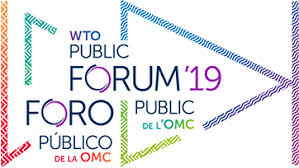Building trust in e-commerce for the next generation
8 Oct 2019 02:00h
Event report
[Read more session reports from WTO Public Forum 2019]
The moderator of the session, Mr Justin Macmullan (Director of Advocacy, Consumers International), highlighted that technology has changed what it is to be a consumer. Trust between consumers and traders is necessary for consumers to exercise their rights and for e-commerce to continue to grow.
Ms Lea Auffret (Trade team leader, BEUC) acknowledged the growth of e-commerce transactions of EU consumers. However, she stressed that consumers tend to shop in their own country or in the EU. They face numerous issues when buying from foreign traders, as they lack essential information to make an appropriate choice, such as the location of the seller and whether their European rights apply. Specific legal frameworks can ensure that consumers will not be cheated, that they will have essential information to make proper choices, and that no discrimination takes place between consumers in the algorithms.
Auffret also highlighted that the boom in delivery by small parcels is overwhelming customs and market authorities who cannot check all of them, and dangerous products are entering markets. It should not be the consumer’s obligation to prove that goods bought online comply with their national legislation. Self-regulation in the area of cybersecurity is not sufficient, and perspective regulation is needed in some cases, such as in the case of connected devices. She underlined that the WTO is not the best venue for discussing data flows, cybersecurity, net neutrality, and algorithmic transparency, but it is the venue that should discuss consumer protection. Small and medium-sized enterprises (SMEs) must respect the rights of EU consumers by complying with the EU General Data Protection Regulation (GDPR). Auffret concluded that a holistic approach to consumer protection with an emphasis on improved co-operation between regulators is necessary.
Ms Burcu Kilic (Director, Digital Rights Program, Public Citizen) highlighted the importance of data protection issues in building trust in the online marketplace. Young consumers are very particular about the kind of data they share, what data is collected, and how that data is processed. She pointed out that the GDPR has inspired an increasing number of countries to adopt national GDPR-like data privacy laws, because consumers have demanded it. Speaking on the consequences of the use of artificial intelligence (AI) on e-commerce, Kilic underlined that algorithms and source code are considered trade secrets by businesses. However, for consumer protection, it is necessary that consumer advocates have access to algorithms and source code. Companies have been pushing for ethical rules for AI, which means self-regulation in this field; but Kilic stressed that regulation is needed instead. The current business model has to change; and that change has been started by GDPR as it requires privacy by design and privacy by default. Companies must comply and adapt to the new business model. Kilic concluded by stating that consumer protection is not a secondary issue; trade negotiators should discuss consumer protection before other trade-related issues because it is a precondition for maintenance and growth of e-commerce and global trade.
Mr Fabio Cassanelli (Co-Founder, Argo Business Solutions srl) stated that companies are aware they need to create trust in order to assure consumers of their credibility. Three main drivers create trust in a company when it comes to current consumers . First, a connection with the brand: millennials are very sensitive to data breaches and will avoid purchasing from a company that has suffered a data breach. Second, sensitivity to design: design needs to be responsive and marked secure. Third, referrals by friends and influencers: millennials put stock in word-of-mouth. He underlined that the EU transfers data only to countries that have adequate safeguards for data in place, which is why an increasing number of countries adopt national GDPR-like data privacy laws. This chain reaction may change the consumer world forever. Cassanelli brought forth the issue of cookie policies on websites, stating that a new technological solution to fix the issue could be articulated in the upcoming ePrivacy regulation. Companies are trying to protect their brand and remove illicit products from the market through intellectual property rights (trademarks, design mark, copyright) claims, but can intervene only on solid legal grounds. They are also increasingly investing in cybersecurity measures to avoid data breaches, which are costly in terms of money and reputation. Cassanelli also underlined that scalable technological solutions are necessary for SMEs to comply with the GDPR. He concluded that the WTO can be an essential player in motivating countries to adopt similar data protection laws in the future, as WTO participation would enable businesses to comply with the rules more easily.
Related topics
Related event

